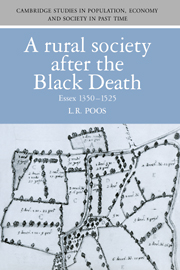Book contents
- Frontmatter
- Contents
- List of figures
- List of tables
- Preface
- Abbreviations
- Part I Reflections on a transitional era
- Part II ‘Country-dwellers, common folk and craftsmen’
- Part III ‘The total sum of all persons’
- Part IV ‘While it is so forward between us’
- Part V ‘She came that day seeking service’
- 9 Servants
- 10 Wages and labourers
- Part VI ‘Beware of such holy men’
- Part VII Synthesis
- Bibliography
- Index
- Cambridge Studies in Population, Economy and Society in Past Time 18
9 - Servants
Published online by Cambridge University Press: 14 September 2009
- Frontmatter
- Contents
- List of figures
- List of tables
- Preface
- Abbreviations
- Part I Reflections on a transitional era
- Part II ‘Country-dwellers, common folk and craftsmen’
- Part III ‘The total sum of all persons’
- Part IV ‘While it is so forward between us’
- Part V ‘She came that day seeking service’
- 9 Servants
- 10 Wages and labourers
- Part VI ‘Beware of such holy men’
- Part VII Synthesis
- Bibliography
- Index
- Cambridge Studies in Population, Economy and Society in Past Time 18
Summary
In any highly differentiated rural society, with many individuals and families partly or heavily dependent upon wages earned through working for others, forms and institutions of hiring are obviously of critical importance to the local economy. In late-medieval Essex agriculturalists, craftsmen and even a few labourers took on non-familial workers to augment their own or their families' capacities. Labour forms and institutions had to be flexible enough to adapt to many different circumstances, arising from agrarian regimes and industrial occupations that varied over time and space, from changes in wage and price levels, and from the many other factors that affected the supply and demand of workers.
But labour forms and institutions in this society did not reside solely in the realm of abstract economic forces. On the contrary, they were at the same time products of, and influences upon, social structure and demographic change. They were the means by which employers evened out the cyclical disparities between their own intrinsic labour reserves – those of their own biological families, if such they had residing with them – and the less readily changeable configurations of land resources or workshops' capacities that they possessed. And from the employees' perspectives, accumulating the practical experience and the material wherewithal to establish themselves in life was likely to be much affected by the ways they were deployed within the matrix of familial and non-familial labour.
In the early-modern English rural economy the most fundamental distinction between labour forms was that between labourers and servants. Put most simply, labourers were generally adults, living within their own households, and hired by others on a short-term basis, often by the day.
- Type
- Chapter
- Information
- A Rural Society after the Black DeathEssex 1350–1525, pp. 183 - 206Publisher: Cambridge University PressPrint publication year: 1991



